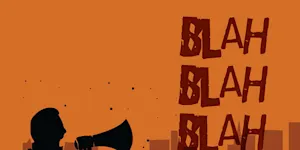What Makes This Word Tick
"Enigmatic" is one of those words that just begs you to use it in a mysterious context. It conjures images of something baffling or puzzling, like a cryptic crossword clue or a shadowy figure in a film noir. When you describe someone as enigmatic, you're suggesting there's more beneath the surface—a tantalizing secret or a mind full of cryptic thoughts.
If Enigmatic Were a Person…
Think of an enigmatic person as the sophisticated party guest who shares fascinating stories without ever fully revealing their origins. They might be the eccentric aunt with a penchant for collecting antique globes, whose travel stories are both captivating and delightfully vague. Always leaving us wanting more, they thrive on keeping the air of mystery alive.
How This Word Has Changed Over Time
The word "enigmatic" hasn't strayed far from its roots, remaining linked to the idea of something that's difficult to interpret. While its use has spiked during times when people craved secrets and suspense—think of the detective novel boom—it's always been a word to add spice to the language, transforming the ordinary into something alluringly unclear.
Old Sayings and Proverbs That Use Enigmatic
While "enigmatic" itself doesn’t feature in age-old proverbs, its essence lives in phrases like "still waters run deep." This common saying touches on the enigmatic quality of individuals who hold depths of character and secrets not easily understood at a glance.
Surprising Facts About Enigmatic
Here's a fun twist: the word "enigmatic" is derived from the Greek ‘ainigma,’ meaning riddle. So, every time you're using it, you're capturing a bit of ancient mystery. Enigmatic individuals have often been subjects of intrigue in various cultures, ranging from wise sages to secluded hermits.
Out and About With This Word
Use "enigmatic" the next time your book club meets and there's a twist in the plot. It's also perfect for describing abstract art pieces or jazz music that leaves you pondering its deeper meanings. Anywhere there's an air of mystery to be teased out, this word fits right in.
Pop Culture Moments Where Enigmatic Was Used
In pop culture, enigmatic figures often become iconic. Think of David Bowie's Ziggy Stardust persona—so much left to the imagination, making it irresistibly fascinating. Film characters like Hannibal Lecter are described as enigmatic for their complex, unreadable nature and motivations.
The Word in Literature
"Enigmatic" frequently graces the pages of mystery novels and psychological thrillers. Characters described as enigmatic add a layer of depth and intrigue, allowing authors to weave complex plots that keep the readers guessing. Shakespeare, for instance, scattered enigmas within his plays, luring audiences with the promise of unraveling them.
Moments in History with Enigmatic
In history, consider the enigma of the Sphinx of Giza, a symbol full of mystery itself, or the enigma machine used during World War II to scramble communication codes. The sense of the enigmatic has often been a driver of human curiosity and innovation throughout time.
This Word Around the World
While English speakers might say someone is "enigmatic," in French, they’d call them "énigmatique," keeping that Latin lilt of intrigue. Across the world in Japan, "nazo-meita" captures a similar essence, referring to something filled with secrets and riddles.
Where Does It Come From?
"Enigmatic" sauntered into English around the early 17th century. Its journey began with the ancient Greeks’ word for riddle, which was passed down through Latin as "aenigma." It’s a linguistic journey fit for the word itself—a bit mysterious and cryptic.
How People Misuse This Word
Some folks might use "enigmatic" when they really mean "eccentric" or simply "complicated." They might call a jumbled technical manual enigmatic, but really, it’s just unnecessarily complex!
Words It’s Often Confused With
Mysterious: Both suggest a secret or unknown quality, but "enigmatic" often hints at greater complexity.
Ambiguous: While both words suggest something unclear, "enigmatic" specifically implies a deeper or concealed intent.
Cryptic: Can be used similarly, but “cryptic” often applies more to language with hidden meanings rather than personalities.
Additional Synonyms and Antonyms
Synonyms for "enigmatic" include puzzling, inscrutable, and arcane. Its antonyms, on the other hand, would be clear, straightforward, and transparent.
Want to Try It Out in a Sentence?
"Though the old clock shop looked ordinary from the street, its interior was delightfully enigmatic, with shadowy corners and ticking sounds that seemed to whisper secrets from the past."
















